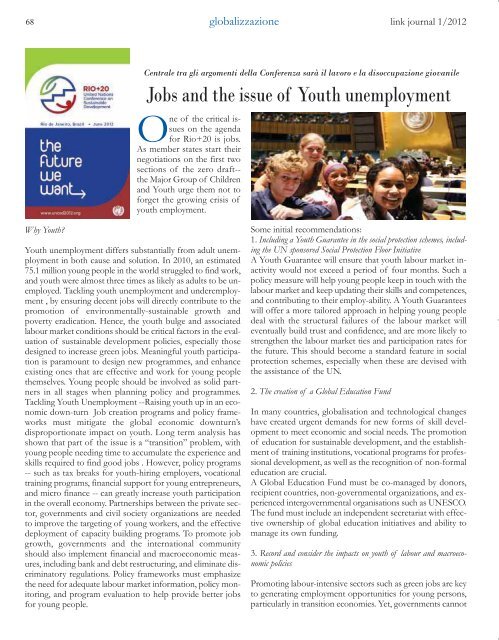Gennaio-marzo 2012 - Link Campus University
Gennaio-marzo 2012 - Link Campus University
Gennaio-marzo 2012 - Link Campus University
Create successful ePaper yourself
Turn your PDF publications into a flip-book with our unique Google optimized e-Paper software.
68 globalizzazione link journal 1/<strong>2012</strong><br />
Why Youth?<br />
Centrale tra gli argomenti della Conferenza sarà il lavoro e la disoccupazione giovanile<br />
Jobs and the issue of Youth unemployment<br />
One of the critical issues<br />
on the agenda<br />
for Rio+20 is jobs.<br />
As member states start their<br />
negotiations on the first two<br />
sections of the zero draft-the<br />
Major Group of Children<br />
and Youth urge them not to<br />
forget the growing crisis of<br />
youth employment.<br />
Youth unemployment differs substantially from adult unemployment<br />
in both cause and solution. In 2010, an estimated<br />
75.1 million young people in the world struggled to find work,<br />
and youth were almost three times as likely as adults to be unemployed.<br />
Tackling youth unemployment and underemployment<br />
, by ensuring decent jobs will directly contribute to the<br />
promotion of environmentally-sustainable growth and<br />
poverty eradication. Hence, the youth bulge and associated<br />
labour market conditions should be critical factors in the evaluation<br />
of sustainable development policies, especially those<br />
designed to increase green jobs. Meaningful youth participation<br />
is paramount to design new programmes, and enhance<br />
existing ones that are effective and work for young people<br />
themselves. Young people should be involved as solid partners<br />
in all stages when planning policy and programmes.<br />
Tackling Youth Unemployment --Raising youth up in an economic<br />
down-turn Job creation programs and policy frameworks<br />
must mitigate the global economic downturn’s<br />
disproportionate impact on youth. Long term analysis has<br />
shown that part of the issue is a “transition” problem, with<br />
young people needing time to accumulate the experience and<br />
skills required to find good jobs . However, policy programs<br />
-- such as tax breaks for youth-hiring employers, vocational<br />
training programs, financial support for young entrepreneurs,<br />
and micro finance -- can greatly increase youth participation<br />
in the overall economy. Partnerships between the private sector,<br />
governments and civil society organizations are needed<br />
to improve the targeting of young workers, and the effective<br />
deployment of capacity building programs. To promote job<br />
growth, governments and the international community<br />
should also implement financial and macroeconomic measures,<br />
including bank and debt restructuring, and eliminate discriminatory<br />
regulations. Policy frameworks must emphasize<br />
the need for adequate labour market information, policy monitoring,<br />
and program evaluation to help provide better jobs<br />
for young people.<br />
Some initial recommendations:<br />
1. Including a Youth Guarantee in the social protection schemes, including<br />
the UN sponsored Social Protection Floor Initiative<br />
A Youth Guarantee will ensure that youth labour market inactivity<br />
would not exceed a period of four months. Such a<br />
policy measure will help young people keep in touch with the<br />
labour market and keep updating their skills and competences,<br />
and contributing to their employ-ability. A Youth Guarantees<br />
will offer a more tailored approach in helping young people<br />
deal with the structural failures of the labour market will<br />
eventually build trust and confidence, and are more likely to<br />
strengthen the labour market ties and participation rates for<br />
the future. This should become a standard feature in social<br />
protection schemes, especially when these are devised with<br />
the assistance of the UN.<br />
2. The creation of a Global Education Fund<br />
In many countries, globalisation and technological changes<br />
have created urgent demands for new forms of skill development<br />
to meet economic and social needs. The promotion<br />
of education for sustainable development, and the establishment<br />
of training institutions, vocational programs for professional<br />
development, as well as the recognition of non-formal<br />
education are crucial.<br />
A Global Education Fund must be co-managed by donors,<br />
recipient countries, non-governmental organizations, and experienced<br />
intergovernmental organisations such as UNESCO.<br />
The fund must include an independent secretariat with effective<br />
ownership of global education initiatives and ability to<br />
manage its own funding.<br />
3. Record and consider the impacts on youth of labour and macroeconomic<br />
policies<br />
Promoting labour-intensive sectors such as green jobs are key<br />
to generating employment opportunities for young persons,<br />
particularly in transition economies. Yet, governments cannot



